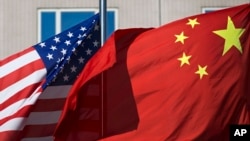China has issued a report documenting alleged human rights abuses in the United States after an annual State Department global rights survey strongly criticized Beijing.
The U.S. report Thursday denounced a broad range of China's policies, including its crackdown on government critics, treatment of ethnic minorities and censorship of the Internet.
The report did note improvements in China's long-reviled one-child policy, which was relaxed last year, and Beijing's decision, in theory, to eliminate its infamous re-education through labor camps.
But the bulk of the 154-page report on China was negative, highlighting human rights issues that have for years been an irritant to relations between the world's two largest economies.
In its own report Friday, China hit back at the U.S., which it said "carefully concealed and avoided its own human rights problems." Specifically, it mentioned civilian deaths in foreign drone strikes, "rampant" domestic gun violence and a "grave employment situation."
Chinese Foreign Ministry spokesman Qin Gang said at a press briefing that the Chinese people are in the best position to judge China's human rights situation.
"Today, China's State Council Information Office issued a white paper on the U.S. human rights record to show to the world whether the United States, which wants to be the grand master of human rights, is endowed to make these kind of judgements," said Qin.
China does not issue rights reports aimed at other countries, but has now done so with the U.S. for each of the last 15 years.
Joseph Cheng, a political science professor at the City University of Hong Kong, told VOA that Beijing's report is meant to expose a supposed U.S. double standard.
"China certainly hopes to demonstrate that the United States is not a credible critic, that it has its own problems in terms of human rights, and is in no position to criticize the human rights situation of countries like China," said Cheng.
But in criticizing the U.S., Cheng said, Beijing encounters a dilemma, as China's official policy is that nations should not interfere with each other's internal politics.
"[It] goes against China's basic position on state sovereignty and non-interference on other countries' domestic affairs. However, if China adopts this position, if China accepts that mutual monitoring, mutual criticisms is the norm of international society, it is a kind of improvement, that is to say, various countries do monitor each other's human rights situation," explained Cheng.
But it is not clear whether China would welcome an open comparison with the United States on human rights, as this would seemingly be an acknowledgement that all countries should be held to certain universal standards.
China has long argued that it should not be held to the same human rights standards as Western countries because of its status as a developing nation. It also rejects any suggestions by the U.S. and others that it must implement what it calls a "Western-style of government."
The U.S. report Thursday denounced a broad range of China's policies, including its crackdown on government critics, treatment of ethnic minorities and censorship of the Internet.
The report did note improvements in China's long-reviled one-child policy, which was relaxed last year, and Beijing's decision, in theory, to eliminate its infamous re-education through labor camps.
But the bulk of the 154-page report on China was negative, highlighting human rights issues that have for years been an irritant to relations between the world's two largest economies.
In its own report Friday, China hit back at the U.S., which it said "carefully concealed and avoided its own human rights problems." Specifically, it mentioned civilian deaths in foreign drone strikes, "rampant" domestic gun violence and a "grave employment situation."
Chinese Foreign Ministry spokesman Qin Gang said at a press briefing that the Chinese people are in the best position to judge China's human rights situation.
"Today, China's State Council Information Office issued a white paper on the U.S. human rights record to show to the world whether the United States, which wants to be the grand master of human rights, is endowed to make these kind of judgements," said Qin.
China does not issue rights reports aimed at other countries, but has now done so with the U.S. for each of the last 15 years.
Joseph Cheng, a political science professor at the City University of Hong Kong, told VOA that Beijing's report is meant to expose a supposed U.S. double standard.
"China certainly hopes to demonstrate that the United States is not a credible critic, that it has its own problems in terms of human rights, and is in no position to criticize the human rights situation of countries like China," said Cheng.
But in criticizing the U.S., Cheng said, Beijing encounters a dilemma, as China's official policy is that nations should not interfere with each other's internal politics.
"[It] goes against China's basic position on state sovereignty and non-interference on other countries' domestic affairs. However, if China adopts this position, if China accepts that mutual monitoring, mutual criticisms is the norm of international society, it is a kind of improvement, that is to say, various countries do monitor each other's human rights situation," explained Cheng.
But it is not clear whether China would welcome an open comparison with the United States on human rights, as this would seemingly be an acknowledgement that all countries should be held to certain universal standards.
China has long argued that it should not be held to the same human rights standards as Western countries because of its status as a developing nation. It also rejects any suggestions by the U.S. and others that it must implement what it calls a "Western-style of government."
